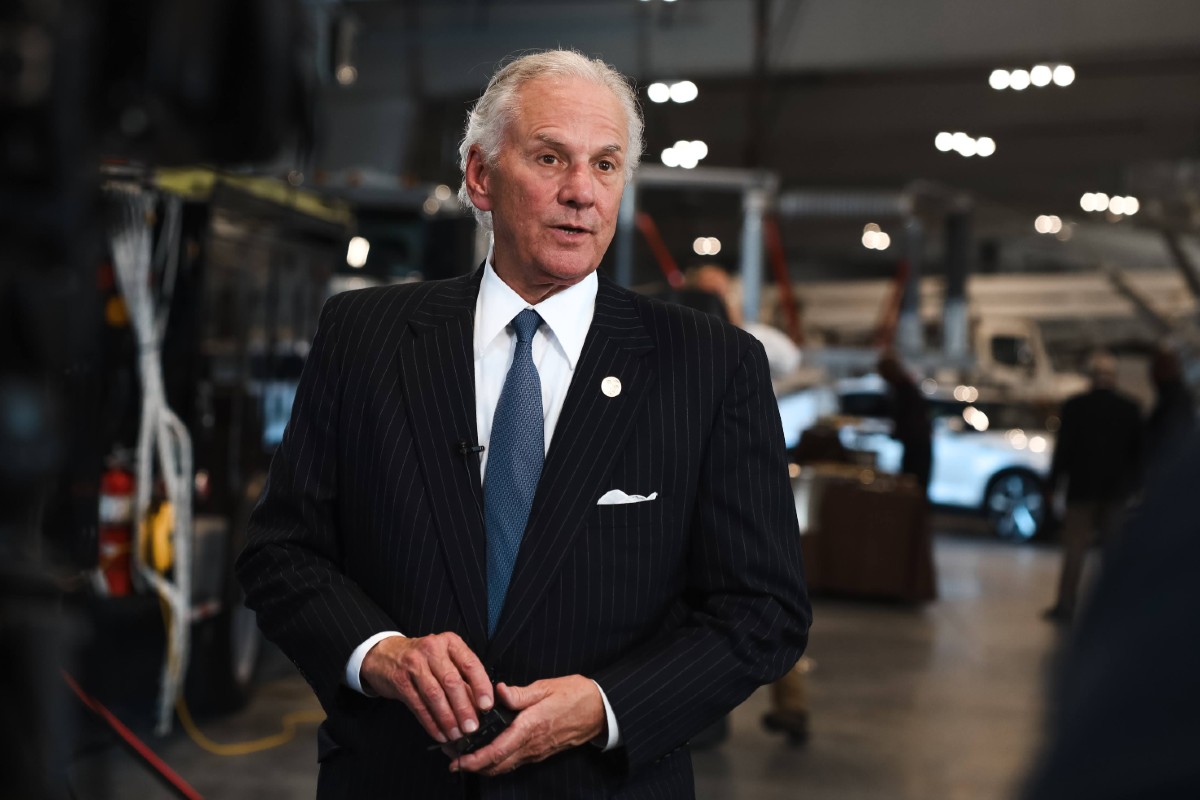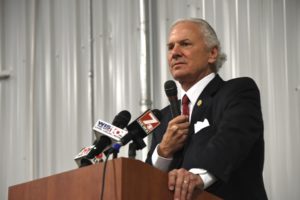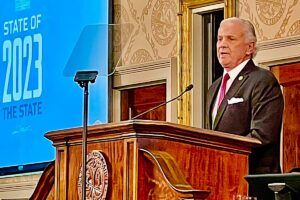
Editor’s Note: Seasoned national political author Louis Jacobson offers a new look at how South Carolina has influenced and will influence national politics in this updated profile in the 2024 edition of the Almanac of American Politics. See the information at the bottom of the article to learn about a special limited offer to purchase this seminal work. Republished with permission.
By Louis Jacobson, Almanac of American Politics | Henry McMaster, a longtime Republican officeholder in South Carolina, was elevated to the governorship in 2017 after Nikki Haley was confirmed as President Donald Trump’s ambassador to the United Nations. He won a full term in 2018 and was reelected easily in 2022, when he was 75.
McMaster, a native of Columbia, received his bachelor’s degree from the University of South Carolina in 1969 and his law degree from the same university four years later. He served a year as a legislative assistant to Sen. Strom Thurmond, after which he built a private practice. In 1981, President Ronald Reagan appointed McMaster to serve as U.S. attorney. During his four years in the post, his office helped convict more than 100 people for importing nearly $1 billion in illegal drugs. In 1986, McMaster ran against longtime Democratic Sen. Ernest Hollings, but lost. Four years later, he ran for lieutenant governor and lost again. In 1991, then-Gov. Carroll Campbell appointed McMaster to the state Commission on Higher Education, and for most of the 1990s, he headed the state Republican Party.
McMaster finally won elected statewide office—attorney general—in 2002. After securing the GOP nomination in a contested primary, McMaster defeated Democratic nominee Steve Benjamin, 56% to 44%, and cruised to a second term four years later. As attorney general, McMaster took a leading national role in opposing the Affordable Care Act. He threw his hat into the ring for the open-seat gubernatorial race in 2010. The large Republican primary field also included Lt. Gov. André Bauer, U.S. Rep. Gresham Barrett, state Sen. Larry Grooms, and state Rep. Nikki Haley; Haley won the primary and then the general election. In 2014, McMaster ran for lieutenant governor, winning the Republican primary and defeating Democrat Bakari Sellers in the general election, 59% to 41%.
Lots of early legislative drama for new governor

As governor, McMaster’s early tenure featured plenty of legislative drama. McMaster vetoed a bill that would have raised the state’s gasoline tax for the first time since 1987, but the measure—which received support from the party’s business wing—became law after the legislature voted by a wide margin to override. He also drew fierce legislative opposition to a spending-bill veto that would have allotted $20.5 million to replace aging and fire-prone school buses; McMaster said it was unwise to earmark lottery funds for that purpose rather than for scholarships. The legislature overwhelmingly overrode that veto, too. Both vetoes were widely believed to be fodder for the GOP’s anti-tax, small-government base as McMaster headed into what promised to be a tough primary challenge.
In the 2018 primary, McMaster faced former state agency head Catherine Templeton, Lt. Gov. Kevin Bryant, former Lt. Gov. Yancey McGill and businessman John Warren. McMaster received endorsements from South Carolina Citizens for Life and the National Rifle Association, and he touted a strong economy, while his opponents attacked him as an apostle of a tired and corrupt political establishment.
McMaster finished first with 42%, followed by Warren with 28%, Templeton with 21%, Bryant with 7% and McGill with 2%. That made McMaster the first modern South Carolina governor in either party to be forced into a primary runoff. On the eve of the runoff, Trump visited South Carolina to promote McMaster, who had been the first statewide official anywhere to back him before the state’s 2016 presidential primary. Trump had the magic touch: McMaster prevailed, 54% to 46%, ceding only a few counties in Warren’s Upstate home base.
In the general election—running for the first time on a ticket with a lieutenant governor candidate following a change in state law—McMaster faced state Rep. James Smith, who Democrats considered a strong candidate. Smith was an Afghanistan combat veteran and an experienced legislative hand who had easily won a three-way primary with the support of national Democratic leaders. But McMaster benefited from a fundraising edge and strong marks for handling the economy, and he won, 54% to 46%.
Approach that mirrored other red state governors
During the coronavirus pandemic in 2020, McMaster’s approach mirrored that of other Republican governors. He issued a stay-at-home order relatively late—he was the last of the 42 governors who did so—and then, within weeks, loosened restrictions on a wide swath of businesses and public amenities. In September 2020, as Trump was facing a tight reelection contest, the president backed off his plans to allow oil and gas drilling off the coast of South Carolina, as well as the coasts of Florida and Georgia, a victory for McMaster.
Beyond signing a bill to grant state employees six weeks of parental leave, most of McMaster’s moves in the two years before his reelection campaign bolstered his standing with social conservatives. He urged the state Education Department to remove the book “Gender Queer: A Memoir” from school bookshelves and to investigate similar titles. He signed legislation to ban transgender students from playing girls’ or women’s sports. And he signed a bill that let physicians, medical students and nurses opt out of procedures that violated their conscience; advocates warned it could deprive LGBTQ residents of medical care.
Abortion was key issue heading to 2022 election

But the longest-running issue involved abortion. In 2021, McMaster signed a “fetal heartbeat” bill that would ban all abortions if a heartbeat is detected, typically at six weeks, unless the pregnancy was caused by rape, incest or threatened the life of the mother. The measure also put the abortion provider at risk of a felony, with a possible prison sentence of two years. The following year, after the U.S. Supreme Court had overturned Roe v. Wade, anti-abortion Republicans sought to tighten the state’s laws further. However, intra-party divisions prevented any new legislation from reaching McMaster’s desk. Then, in January 2023, the state supreme court struck down the 2021 heartbeat bill, effectively returning abortion law in the state to 20 weeks of pregnancy.
Despite having already become South Carolina’s oldest governor, McMaster sought another term in 2022. (His father, an attorney, was handling cases at 93 and died at 99.) McMaster faced former Democratic U.S. Rep. Joe Cunningham, who had served one term in the Charleston-based district. He chose Tally Parham Casey, a lawyer and former F-16 fighter pilot, as his running mate. Cunningham proposed ending the state income tax and replacing it with revenue from legalizing marijuana and sports betting; he also touted the fact that he was a little over half McMaster’s age. Cunningham sought to take advantage of McMaster’s comment at a debate that he would support banning same-sex marriage if the Supreme Court allowed it, adding, “Maybe I’m old fashioned, but I think marriage ought to be between a man and a woman.”
Voters, however, preferred McMaster’s experience to the opponent he characterized in his first TV ad: The ad called Cunningham a “frat boy” who “drinks beer in Congress” and “loves weed.” McMaster amassed the largest margin of any South Carolina gubernatorial winner in more than three decades; his 58% to 41% win was about twice as large as his margin four years earlier. McMaster even defeated Cunningham in mail-in votes, which normally favor Democrats heavily, Charleston’s Post and Courier reported. “In South Carolina, the ‘Red Wave’ came,” state GOP chair Drew McKissick told reporters.
LIMITED OFFER: For more than five decades, the Almanac of American Politics has set the standard for political reference books. Later this month, the Almanac will be publishing its 2024 edition, with some 2,200 pages offering fully updated chapters on all 435 House members and their districts, all 100 senators, all 50 states and governors, and much more.
Louis Jacobson, a senior author of the Almanac and a contributor to seven volumes, writes the 100 state and gubernatorial chapters. Here are the chapters he wrote for the Almanac about South Carolina and Gov. Henry McMaster.
Readers can receive a 15 percent discount if they purchase the 2024 edition through the Almanac’s website — https://www.thealmanacofamericanpolitics.com/ — and apply the code CCP15ALM at checkout. The offer is good through August.
- Have a comment? Send to: feedback@statehousereport.com


